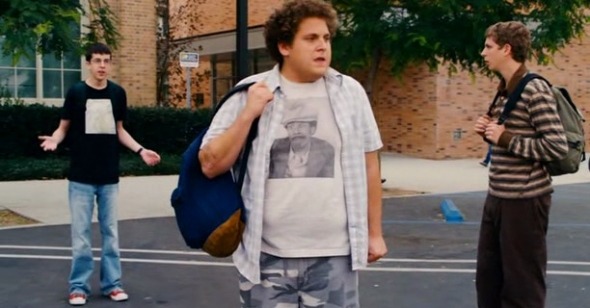No Regrets for Our Youth
by Emily Condon
Superbad
Dir. Greg Mottola, U.S., Sony
Cinematic dreck is often accompanied by particularly lame marketing tactics, ranging from the ludicrous apples-and-oranges method (“It’s Dirty Dancing meets The Blair Witch Project”) to the clunky, desperate come-on (“From the studio that brought you Daddy Day Care!”). So when screenings of Knocked Up, the latest entry in the smaller-than-it-seems Judd Apatow canon, were preceded by a trailer for Superbad that touted its “From the guy who brought you Talladega Nights and The 40-Year-Old Virgin” pedigree, it was difficult to stifle a yawn. Savvy viewers know the “makers of” stamp means little: Alan Rudolph held integral production positions on many of Robert Altman’s best films, and Altman in turn produced several of Rudolph’s, but Welcome to L.A. is no Nashville. Try as the marketing team might, Superbad is not written or directed by Judd Apatow (nor, for that matter, is Talladega Nights, which, like this, he produced). Audiences should be thankful for that fact, because Superbad is substantially better than either of Apatow’s two features, The 40-Year-Old Virgin and Knocked Up.
Directed by The Daytrippers’ Greg Mottola, Superbad locates itself in a typical suburban high school, where the specter of potential humiliation is ubiquitous, from the lunchroom to the soccer field to cooking class. And then there are the parties, where respectable social status can vanish with one errant glance. Socially challenged high school seniors Seth (Jonah Hill) and Evan (Michael Cera), enjoy a longstanding friendship that hinges on their mutual need for companionship amidst so many minefields. When joined by the somewhat less than conventionally attractive Fogell (Christopher Mintz-Plasse), the boys comprise a trio of virgins looking to get laid before heading off to the sexual playground called college. When pouty-lipped Jules asks Seth to secure alcohol for a party, the boys finally see an opportunity to shed their virgin shame. But, as anyone who recalls teenage sex (and/or the lack thereof) knows, it never, ever goes as planned. The rest of the film follows Seth, Evan, and Fogell (a.k.a. McLovin) as they cavort with drunken cops, fend off suddenly undesirable “blow js,” acquire an especially unfortunate pants stain, and much more. The plot itself may be a standard loveable losers sex romp, but Superbad racks up so many laughs and features such real, resonant dialogue and characterizations that it bears scant resemblance to the T&A fests that probably made it possible.
The script comes from Seth Rogen, who appears in the film as Officer Michaels and previously played the lead in Knocked Up, and his childhood friend Evan Goldberg. They claim that they sketched out the script at age 13, and juvenile abandon permeates throughout. But there’s a mature subtlety and depth of insight that’s notable particularly when considered next to films like the aforementioned Talladega Nights or the two entries from Apatow. Where those films embody convention even as they purport to shatter stereotypes, Superbad exhibits a surprisingly nuanced sensibility. Myriad so-called irreverent comedies, even when they’re funny, languish in exploitation, misogyny, and pat conventionality. But Superbad eschews these hallmarks, instead joyously emphasizing male friendship, respect for women, and open dialogue between opposing demographics. Even the more peripheral characters defy expectation—the female characters, for example, avoid the genre’s typical bimbo vs. high maintenance harpy dialectic, and just when the dim-witted officers seem beyond hope, they prove their decency, if not their competence.
Of course, praise for a sex romp’s enlightened ethos makes it sound, well, boring. Far be it from me to misrepresent the film as preachy or dull—the fact is, the sold-out audience with which I saw Superbad laughed, and applauded, more than any film audience in my recent memory. Michael Cera’s flat-as-a-pancake delivery as Evan is so pitch perfect it’s impossible to imagine another actor in the role, and as Fogell, Christopher Mintz-Plasse radiates improbable cool in a way Robert Carradine could only dream of. Jonah Hill’s Seth offers the film’s only weak link, and that’s not to say he’s bad, exactly—Hill abides by Rogen’s chubby, Jew-fro archetype, but he lacks his self-deprecating charm and subtle sensitivity. The result is that Seth, at turns selfish, bullish, and unappealingly crass, is a difficult protagonist to root for. When he drunkenly confesses to Jules that he wants her as a girlfriend, one hopes she’ll relent while nevertheless wondering, “My god, why on earth should she?” The film’s only significant failing is that it assumes that we should unquestionably root for the underdogs. In Hill’s case, being chubby and insecure may not be enough to endear him to our hearts.
That being said, the reasons to recommend Superbad are numerous and compelling, from its rare emphasis on male, rather than female, genitalia, to its almost nonstop barrage of laugh-out-loud moments. And then there’s the film’s most remarkable contribution, which lies in its willingness to champion dude love. A stark contrast to the smug homophobia of comedies like I Now Pronounce You Chuck and Larry, The Ten, and Blades of Glory, Superbad is possibly the only major release drenched with dick-and-pussy references that also embraces flagrant, if platonic, male affection. It may be a bitter pill for ladies to swallow (as if it weren’t hard enough, straight men are now more capable of loving each other than us?), but as communication—and, undoubtedly, the teenage boy—grows ever more addled, it feels like real progress to hear Seth and Evan say, and mean, those three timeless little words.
